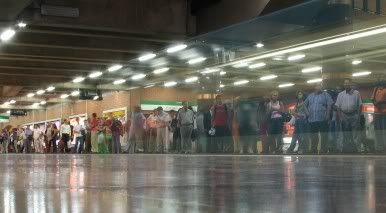Metro
Originally posted to El Cantar de la Lluvia on Friday, November 04, 2005.
The first carriage of Santiago's Metro can be separated into two sections. These are: front and rear. The front section corresponds to the first quarter of the carriage and the rear, the remaining three quarters. The rest of the carriages are not at all interesting, and their properties are analogous to the rear section of the first carriage.
The criteria by which these sections are defined is merely one of function: to the untrained eye, both are part of the same carriage, with no demarcations or distinguishing geometrical features to tell them apart. Their differences are to be found in their qualities, since both have positive and negative characteristics.
The front section benefits the passenger during rush hour with a lower overall density of bodies. The astute passenger will choose to position himself at the particular point on the platform where the first door will be when the train arrives. He will this enjoy a lower probability of travelling in a very uncomfortable (one could almost say intimate) way, or perhaps even of being left standing on the platform, watching those luckier than he disappear into the tunnel's black maw.
On the other hand, though one may travel slightly more comfortable in the first section, the ventilation here is notoriously inadequate. The carriage's windows admit a moderate flow of air, but it flows towards the rear section, leaving the front of the carriage to stew in its own stagnant air.
 It is within this stale air that we find fourteen passengers, eleven quiet two engaged in conversation. To the right of the door, under the emergency brake handle, we find Enrique G. Enrique is short, in his thrties. His face is slightly angular, yet friendly; as a matter of fact, it would not have been much of a surprise to find him gleefully participating in the Nueva Ola 60s music all those years ago. At least some part of this alternate and hypothetically previous life must have seeped into his conciousness, since he is wearing a wide-sleeved brown shirt and his sideburns travel way beyond what one could honestly call a casual length.
It is within this stale air that we find fourteen passengers, eleven quiet two engaged in conversation. To the right of the door, under the emergency brake handle, we find Enrique G. Enrique is short, in his thrties. His face is slightly angular, yet friendly; as a matter of fact, it would not have been much of a surprise to find him gleefully participating in the Nueva Ola 60s music all those years ago. At least some part of this alternate and hypothetically previous life must have seeped into his conciousness, since he is wearing a wide-sleeved brown shirt and his sideburns travel way beyond what one could honestly call a casual length.
Renato M. (two bodies distant, approximately on the carriage's center line and in front of the door) spotted him a few minutes ago. His appearance caught Renato's attention. And thus began one of those dreaded moments during which Renato descends into a whirlpool of doubts about his sexuality. It doesn't happen often, and he tries to sleep with a different woman at least twice a month so as to calm these existential doubts. Nonetheless, every now and then, during idle moments, he will notice another man, someone who looks interesting, and then he will begin questioning himself as to whether he has been staring at him for too long (which drives him to mental self-flagellation, and thus it becomes irresistible to look at the man again, one last time, a short little peek, please). His heart thumps in his chest and he starts to sweat. In earnest.
José M. is also sweating, just like every other passenger, but due to those incomprehensible misteries of chance and genetics, he announces his secretions with a chemical fanfare that has more than a few people alsmot dizzy (Renato wonders if perhaps his confusion is due to the smelly guy's pheromones). José is one of those chatting, and before he got to the station, as he walked from the university, he smoked a few cigs. The acrid and bitter stench of sweaty ashtray is his personal mark.
Regarding his conversation partner we will say nothing; he will pass away tomorrow morning in a crash and it wouldn't be prudent to immortalize him in such a trivial story as this.
Evelyn H. is in the corner which is diagonally opposite to Renato. She is dressed semi-formally. She looks out the window, and seems sad, pensive. Another passenger standing nearby, whom is also thinking about his fellow travellers, tells himself that the girl is quite certainly sad because she has recently broken free from a bitter relationship.
He then adds the mental note that it was probably ended by her, due to the horrible treatment she got from her boyfriend. And that's not all: friends and family had insisted that he wasn't good enough for her. Breaking up with him must have surely required all the energy that her small body and soul could muster. Satisfied with his analysis, his attention turned to the possible ways in which one could begin a conversation with her. Now that was certainly a complex task! He pondered how to communicate to this girl, by means of a casual conversation (almost tacitly forbidden on the Metro, due to its scarcity among strangers), that he was a nice, reasonable guy, that he enjoyed going to the cinema and that he had a lot of love to give, if only she would give him the slightest chance to prove himself to her! He would certainly treat her better than her ex. He had no idea if the girl was of a liberal inclination or if he would have to wait before getting into bed with her, but he was certainly willing to wait, and that patience would show her the purity of his intent.
 Evelyn is actually thinking about her shower's drain. This morning the water had taken an exceedingly long time to go down. As soon as she got home she'd have to pour some caustic soda granules down it, to see if that did the trick. That train of thought reminded her (as it happened every time that she mentioned or thought of caustic soda) of that experiment that she did with her classmates in science class in school, with a poplar leaf. They left it soaking in a caustic soda solution during a whole week, and in the end all that was left was the leaf's ghost, translucent and delicate like a jellyfish. She thinks to herself that she'd like to do it again, perhaps with a larger leaf, though she probably won't. These ideas always disappear upon arriving home, almost as if it were another Evelyn that existed at work and at home. During her idle moments, such as when she travelled on the Metro, she would always get these ideas.
Evelyn is actually thinking about her shower's drain. This morning the water had taken an exceedingly long time to go down. As soon as she got home she'd have to pour some caustic soda granules down it, to see if that did the trick. That train of thought reminded her (as it happened every time that she mentioned or thought of caustic soda) of that experiment that she did with her classmates in science class in school, with a poplar leaf. They left it soaking in a caustic soda solution during a whole week, and in the end all that was left was the leaf's ghost, translucent and delicate like a jellyfish. She thinks to herself that she'd like to do it again, perhaps with a larger leaf, though she probably won't. These ideas always disappear upon arriving home, almost as if it were another Evelyn that existed at work and at home. During her idle moments, such as when she travelled on the Metro, she would always get these ideas.
She looks up briefly and wonders if others are having free thoughts, dreaming, like her. No, she said. I'm sure everyone is thinking normal things.
The doors open and new people start shuffling in.
The first carriage of Santiago's Metro can be separated into two sections. These are: front and rear. The front section corresponds to the first quarter of the carriage and the rear, the remaining three quarters. The rest of the carriages are not at all interesting, and their properties are analogous to the rear section of the first carriage.
The criteria by which these sections are defined is merely one of function: to the untrained eye, both are part of the same carriage, with no demarcations or distinguishing geometrical features to tell them apart. Their differences are to be found in their qualities, since both have positive and negative characteristics.
The front section benefits the passenger during rush hour with a lower overall density of bodies. The astute passenger will choose to position himself at the particular point on the platform where the first door will be when the train arrives. He will this enjoy a lower probability of travelling in a very uncomfortable (one could almost say intimate) way, or perhaps even of being left standing on the platform, watching those luckier than he disappear into the tunnel's black maw.
On the other hand, though one may travel slightly more comfortable in the first section, the ventilation here is notoriously inadequate. The carriage's windows admit a moderate flow of air, but it flows towards the rear section, leaving the front of the carriage to stew in its own stagnant air.
 It is within this stale air that we find fourteen passengers, eleven quiet two engaged in conversation. To the right of the door, under the emergency brake handle, we find Enrique G. Enrique is short, in his thrties. His face is slightly angular, yet friendly; as a matter of fact, it would not have been much of a surprise to find him gleefully participating in the Nueva Ola 60s music all those years ago. At least some part of this alternate and hypothetically previous life must have seeped into his conciousness, since he is wearing a wide-sleeved brown shirt and his sideburns travel way beyond what one could honestly call a casual length.
It is within this stale air that we find fourteen passengers, eleven quiet two engaged in conversation. To the right of the door, under the emergency brake handle, we find Enrique G. Enrique is short, in his thrties. His face is slightly angular, yet friendly; as a matter of fact, it would not have been much of a surprise to find him gleefully participating in the Nueva Ola 60s music all those years ago. At least some part of this alternate and hypothetically previous life must have seeped into his conciousness, since he is wearing a wide-sleeved brown shirt and his sideburns travel way beyond what one could honestly call a casual length.Renato M. (two bodies distant, approximately on the carriage's center line and in front of the door) spotted him a few minutes ago. His appearance caught Renato's attention. And thus began one of those dreaded moments during which Renato descends into a whirlpool of doubts about his sexuality. It doesn't happen often, and he tries to sleep with a different woman at least twice a month so as to calm these existential doubts. Nonetheless, every now and then, during idle moments, he will notice another man, someone who looks interesting, and then he will begin questioning himself as to whether he has been staring at him for too long (which drives him to mental self-flagellation, and thus it becomes irresistible to look at the man again, one last time, a short little peek, please). His heart thumps in his chest and he starts to sweat. In earnest.
José M. is also sweating, just like every other passenger, but due to those incomprehensible misteries of chance and genetics, he announces his secretions with a chemical fanfare that has more than a few people alsmot dizzy (Renato wonders if perhaps his confusion is due to the smelly guy's pheromones). José is one of those chatting, and before he got to the station, as he walked from the university, he smoked a few cigs. The acrid and bitter stench of sweaty ashtray is his personal mark.
Regarding his conversation partner we will say nothing; he will pass away tomorrow morning in a crash and it wouldn't be prudent to immortalize him in such a trivial story as this.
Evelyn H. is in the corner which is diagonally opposite to Renato. She is dressed semi-formally. She looks out the window, and seems sad, pensive. Another passenger standing nearby, whom is also thinking about his fellow travellers, tells himself that the girl is quite certainly sad because she has recently broken free from a bitter relationship.
He then adds the mental note that it was probably ended by her, due to the horrible treatment she got from her boyfriend. And that's not all: friends and family had insisted that he wasn't good enough for her. Breaking up with him must have surely required all the energy that her small body and soul could muster. Satisfied with his analysis, his attention turned to the possible ways in which one could begin a conversation with her. Now that was certainly a complex task! He pondered how to communicate to this girl, by means of a casual conversation (almost tacitly forbidden on the Metro, due to its scarcity among strangers), that he was a nice, reasonable guy, that he enjoyed going to the cinema and that he had a lot of love to give, if only she would give him the slightest chance to prove himself to her! He would certainly treat her better than her ex. He had no idea if the girl was of a liberal inclination or if he would have to wait before getting into bed with her, but he was certainly willing to wait, and that patience would show her the purity of his intent.
 Evelyn is actually thinking about her shower's drain. This morning the water had taken an exceedingly long time to go down. As soon as she got home she'd have to pour some caustic soda granules down it, to see if that did the trick. That train of thought reminded her (as it happened every time that she mentioned or thought of caustic soda) of that experiment that she did with her classmates in science class in school, with a poplar leaf. They left it soaking in a caustic soda solution during a whole week, and in the end all that was left was the leaf's ghost, translucent and delicate like a jellyfish. She thinks to herself that she'd like to do it again, perhaps with a larger leaf, though she probably won't. These ideas always disappear upon arriving home, almost as if it were another Evelyn that existed at work and at home. During her idle moments, such as when she travelled on the Metro, she would always get these ideas.
Evelyn is actually thinking about her shower's drain. This morning the water had taken an exceedingly long time to go down. As soon as she got home she'd have to pour some caustic soda granules down it, to see if that did the trick. That train of thought reminded her (as it happened every time that she mentioned or thought of caustic soda) of that experiment that she did with her classmates in science class in school, with a poplar leaf. They left it soaking in a caustic soda solution during a whole week, and in the end all that was left was the leaf's ghost, translucent and delicate like a jellyfish. She thinks to herself that she'd like to do it again, perhaps with a larger leaf, though she probably won't. These ideas always disappear upon arriving home, almost as if it were another Evelyn that existed at work and at home. During her idle moments, such as when she travelled on the Metro, she would always get these ideas.She looks up briefly and wonders if others are having free thoughts, dreaming, like her. No, she said. I'm sure everyone is thinking normal things.
The doors open and new people start shuffling in.
Labels: stories




 The Lagoons of the Santuario de la Naturaleza 2: Laguna Los Ángeles
The Lagoons of the Santuario de la Naturaleza 2: Laguna Los Ángeles Race Day At Leyda 4
Race Day At Leyda 4 El Tabo and the Central Hidroeléctrica El Sauce
El Tabo and the Central Hidroeléctrica El Sauce Exploring The Hills Around Lampa
Exploring The Hills Around Lampa A Different Route To Baños De Colina
A Different Route To Baños De Colina The Mines of the Cuesta La Dormida
The Mines of the Cuesta La Dormida The Frozen Lagoons of the Santuario de la Naturaleza
The Frozen Lagoons of the Santuario de la Naturaleza Second Mass Demonstration "For A Fair Tag"
Second Mass Demonstration "For A Fair Tag" First Mass Demonstration Against The 'Tag'
First Mass Demonstration Against The 'Tag' Enduro In Lagunillas
Enduro In Lagunillas Embalse El Yeso and Termas Del Plomo
Embalse El Yeso and Termas Del Plomo Ride To Peñuelas
Ride To Peñuelas Cerro Chena
Cerro Chena Race Day at Leyda 3
Race Day at Leyda 3 Baños de Colina 2
Baños de Colina 2 Carretera Austral: Epilogue
Carretera Austral: Epilogue The Little Giant and Termas del Plomo
The Little Giant and Termas del Plomo Back on Two Wheels
Back on Two Wheels 2006 Photographic Retrospective
2006 Photographic Retrospective Race Day At Leyda 2
Race Day At Leyda 2  Quantum Optics III in Pucón
Quantum Optics III in Pucón Meseta In Chicureo
Meseta In Chicureo Pick Up Your Beer Bottle And Fuck Off
Pick Up Your Beer Bottle And Fuck Off  Planes And Hills
Planes And Hills Cut-Off Road
Cut-Off Road Lagunillas
Lagunillas Laguna Verde 2
Laguna Verde 2 Ride To Anywhere But Aculeo
Ride To Anywhere But Aculeo Cerro El Roble, Second Attempt
Cerro El Roble, Second Attempt Baños De Colina
Baños De Colina Some Walk On Water...
Some Walk On Water... Race Day At Leyda
Race Day At Leyda Almost Cerro El Roble
Almost Cerro El Roble Off To Curacaví with Andrés
Off To Curacaví with Andrés La Serena, Part 3: Back To Santiago
La Serena, Part 3: Back To Santiago  A Bull, Two Cows and a Chilean Fox
A Bull, Two Cows and a Chilean Fox Escape To Cuesta La Dormida
Escape To Cuesta La Dormida Valve Adjustment
Valve Adjustment La Serena, Part 2B: Valle Del Elqui
La Serena, Part 2B: Valle Del Elqui La Serena, Part 2A: Coquimbo and La Recova
La Serena, Part 2A: Coquimbo and La Recova Mud And Pine Trees
Mud And Pine Trees La Serena, Part 1
La Serena, Part 1 Pimp My Exhaust
Pimp My Exhaust Ride To Laguna Verde
Ride To Laguna Verde Ride To La Mina
Ride To La Mina Ride To Termas El Plomo
Ride To Termas El Plomo Camping in Colliguay
Camping in Colliguay Ride To Portillo
Ride To Portillo Ride To Olmué and Con Con
Ride To Olmué and Con Con Siete Tazas
Siete Tazas Watching The Departure Of The Day That Brought Me Here
Watching The Departure Of The Day That Brought Me Here Buenos Aires Motorbikes
Buenos Aires Motorbikes Ride to Talca with the Adach Group
Ride to Talca with the Adach Group Las Trancas '05
Las Trancas '05 Towers and Hills
Towers and Hills María Pinto, Melipilla, Aculeo
María Pinto, Melipilla, Aculeo Me and my Carb
Me and my Carb




0 Comments:
Post a Comment
<< Home